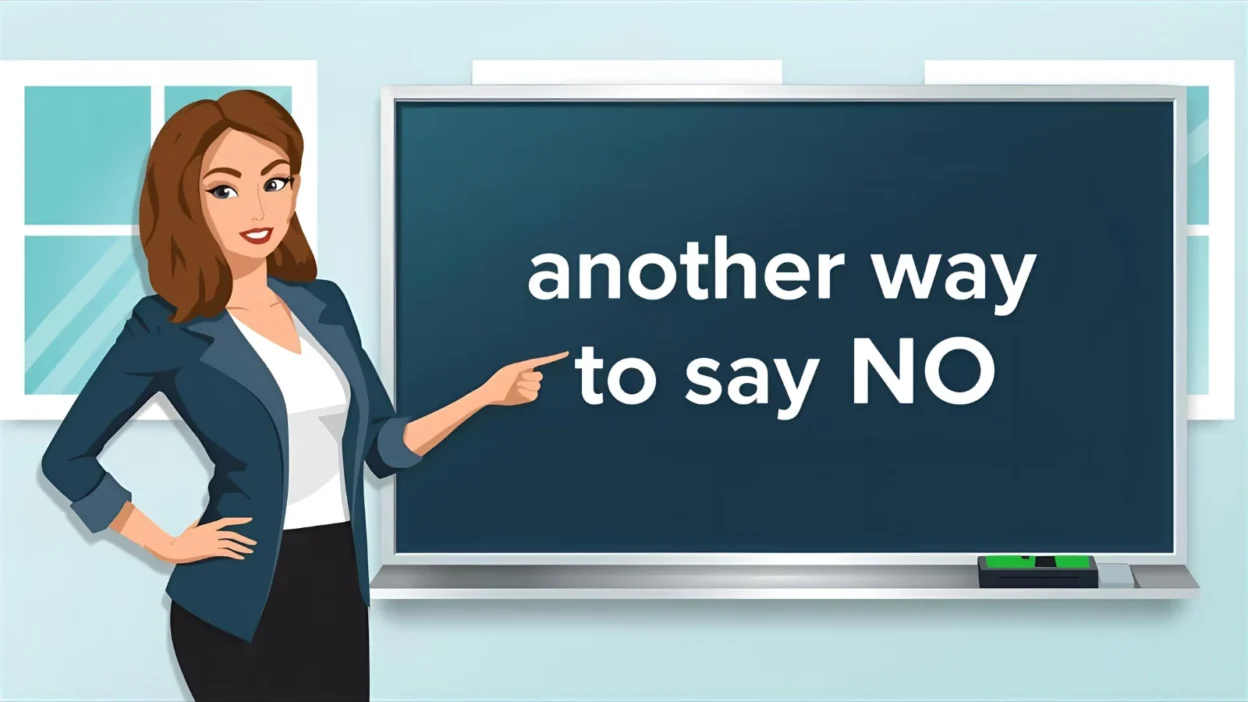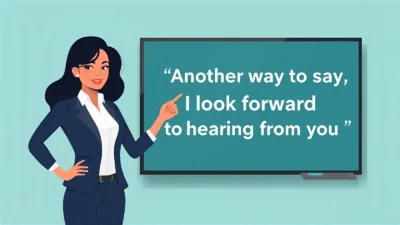Saying “no” is an essential skill in both professional and personal communication. It helps set boundaries, manage time, and maintain integrity—but it can often feel harsh, abrupt, or uncomfortable.
The good news? There are many ways to decline politely, professionally, or gently—depending on your relationship with the person and the situation.
Below are 49 alternatives to “no”, each with its meaning, detailed explanation, example, best use, and tone, so you can decline confidently without sounding rude or dismissive.
💼 Professional Ways to Say “No”
1. Unfortunately, I Can’t
Meaning: A polite and empathetic way to decline.
Detailed Explanation: Softens the refusal by acknowledging regret.
Example: Unfortunately, I can’t attend the meeting tomorrow.
Best Use: Professional or formal settings.
Tone: Polite, professional, regretful.
2. I’m Afraid I Can’t
Meaning: A gentle and respectful refusal.
Detailed Explanation: Adds empathy and understanding to your “no.”
Example: I’m afraid I can’t take on another project right now.
Best Use: Professional and social contexts.
Tone: Courteous, soft, considerate.
3. I Wish I Could
Meaning: Expresses genuine regret while declining.
Detailed Explanation: Shows appreciation for the request even as you say no.
Example: I wish I could help, but my schedule is full this week.
Best Use: Friendly or empathetic refusals.
Tone: Warm, understanding, kind.
4. That Won’t Be Possible
Meaning: A direct but formal refusal.
Detailed Explanation: Best for maintaining authority or professionalism.
Example: That won’t be possible under the current budget.
Best Use: Business discussions, workplace communication.
Tone: Professional, assertive, firm.
5. I Don’t Think That Will Work
Meaning: A diplomatic way to disagree or decline.
Detailed Explanation: Invites discussion rather than a flat rejection.
Example: I don’t think that will work, but I’m open to alternatives.
Best Use: Team meetings, collaborative work.
Tone: Diplomatic, collaborative, respectful.
6. I Appreciate the Offer, but I’ll Have to Decline
Meaning: Combines gratitude with a firm “no.”
Detailed Explanation: Keeps the tone positive and respectful.
Example: I appreciate the offer, but I’ll have to decline this time.
Best Use: Professional invitations or opportunities.
Tone: Polite, formal, appreciative.
7. That Doesn’t Fit My Schedule
Meaning: Gives a practical reason for saying no.
Detailed Explanation: Keeps the refusal impersonal and professional.
Example: That doesn’t fit my schedule right now, but thank you for asking.
Best Use: Work meetings, scheduling requests.
Tone: Professional, respectful, factual.
8. I’m Fully Booked
Meaning: Indicates unavailability without direct refusal.
Detailed Explanation: Useful for polite, boundary-setting communication.
Example: I’m fully booked this week, but maybe next month?
Best Use: Client or meeting scheduling.
Tone: Polite, neutral, professional.
9. I’m Not Able to Commit Right Now
Meaning: Declines with future flexibility.
Detailed Explanation: Keeps the door open while maintaining honesty.
Example: I’m not able to commit right now, but I’ll let you know if things change.
Best Use: Long-term projects or requests.
Tone: Diplomatic, calm, courteous.
10. It’s Not Feasible at the Moment
Meaning: A professional, neutral way to say “no.”
Detailed Explanation: Avoids emotion while focusing on practicality.
Example: It’s not feasible at the moment due to limited resources.
Best Use: Business or formal correspondence.
Tone: Formal, factual, composed.
🫶 Polite and Friendly Alternatives
11. Maybe Next Time
Meaning: A gentle refusal with optimism for the future.
Detailed Explanation: Leaves a positive impression while declining.
Example: Maybe next time—I’d love to join if I can!
Best Use: Social invitations, casual interactions.
Tone: Friendly, warm, lighthearted.
12. I’d Love To, But I Can’t
Meaning: Combines enthusiasm with regret.
Detailed Explanation: Balances positivity with honesty.
Example: I’d love to come to dinner, but I can’t make it tonight.
Best Use: Social situations, friendly exchanges.
Tone: Kind, personable, apologetic.
13. I’m Sorry, Not This Time
Meaning: A gentle but firm way to decline.
Detailed Explanation: Keeps the door open for future opportunities.
Example: I’m sorry, not this time. Let’s plan something soon though!
Best Use: Casual social settings.
Tone: Friendly, sincere, soft.
14. I’ll Have to Pass
Meaning: A polite and modern way to decline.
Detailed Explanation: Works well for both formal and informal settings.
Example: Thanks for the offer, but I’ll have to pass.
Best Use: Invitations, suggestions, or tasks.
Tone: Neutral, easygoing, polite.
15. Not Right Now
Meaning: Delays rather than denies a request.
Detailed Explanation: Keeps things positive without committing.
Example: Not right now, but I’ll consider it later.
Best Use: Low-stakes refusals.
Tone: Gentle, flexible, polite.
💬 Diplomatic or Indirect Ways to Say “No”
16. Let Me Get Back to You
Meaning: Politely delays your decision.
Detailed Explanation: Useful when you need time to think or decline later.
Example: Let me get back to you after reviewing my schedule.
Best Use: Business communication, uncertain situations.
Tone: Professional, thoughtful, cautious.
17. That’s Not Going to Work for Me
Meaning: Declines while maintaining respect and boundaries.
Detailed Explanation: Useful for personal or professional boundaries.
Example: That’s not going to work for me, but I appreciate the offer.
Best Use: Assertive communication.
Tone: Respectful, confident, firm.
18. That’s Not Something I Can Take On
Meaning: A clear but kind refusal.
Detailed Explanation: Useful when you’re avoiding overcommitment.
Example: That’s not something I can take on right now.
Best Use: Work or project discussions.
Tone: Professional, polite, clear.
19. It’s Not a Good Fit
Meaning: Declines with tact, often used in hiring or collaboration.
Detailed Explanation: Avoids direct rejection language.
Example: We’ve decided it’s not a good fit at this time.
Best Use: HR, partnerships, collaborations.
Tone: Diplomatic, formal, respectful.
20. I’ll Have to Decline
Meaning: A straightforward but polite refusal.
Detailed Explanation: Best for formal replies where brevity is valued.
Example: I’ll have to decline your invitation, but thank you so much.
Best Use: Business emails, event invitations.
Tone: Polite, formal, concise.
💗 Empathetic or Soft “No” Phrases
21. I Really Appreciate You Thinking of Me
Meaning: Expresses gratitude while declining.
Detailed Explanation: Keeps the tone kind and positive.
Example: I really appreciate you thinking of me, but I’ll have to pass this time.
Best Use: Invitations, opportunities, or favors.
Tone: Warm, appreciative, gentle.
22. That Sounds Great, But I Can’t Commit
Meaning: Declines with positive acknowledgment.
Detailed Explanation: Shows interest but sets limits.
Example: That sounds great, but I can’t commit right now.
Best Use: Social or collaborative offers.
Tone: Friendly, open, honest.
23. Thanks, But I’ll Pass
Meaning: A casual and easygoing refusal.
Detailed Explanation: Simple and polite, commonly used among peers.
Example: Thanks, but I’ll pass on this one.
Best Use: Everyday interactions.
Tone: Friendly, casual, respectful.
24. I’m Choosing to Focus on Other Priorities
Meaning: A mature and professional way to decline.
Detailed Explanation: Offers context without unnecessary apology.
Example: I’m choosing to focus on other priorities this quarter.
Best Use: Business communication, time management.
Tone: Assertive, professional, composed.
25. That’s Kind of You, But I’ll Decline
Meaning: Polite and considerate.
Detailed Explanation: A warm way to say no while appreciating the offer.
Example: That’s kind of you, but I’ll decline for now.
Best Use: Polite social or business refusals.
Tone: Gracious, kind, respectful.
Conclusion
Saying “no” doesn’t have to feel uncomfortable or impolite. With the right phrasing, you can maintain professionalism, warmth, and respect—without compromising your boundaries.
Whether you say “Unfortunately, I can’t,” “I’ll have to pass,” or “That won’t be possible,” the key is to balance honesty with empathy.
A well-worded “no” isn’t rejection—it’s communication done with confidence and clarity.



